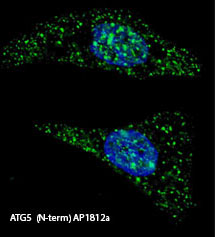Most Cited Autophagy Antibodies

Autophagy plays a fundamental role in cancer, neuroscience and stem cell research.
Do you have the best antibody for your autophagy research?
Abgent believes that choosing quality antibodies will lead to results you can trust. The best measure of antibody quality is the citation frequency within the literature.
Many of Abgent's antibodies are highly cited in the literature, i.e. antibodies against LC3, p62 and ATG5. Moreover, our anti-ATG5 Antibody (Cat. # AP1812a) has led to the discovery of a novel tumor suppressor!
www.ncbi.nlm.nih.gov/pubmed/24027027
Abgent will continue to manufacture high-quality antibodies that accelerate discovery. We look forward to working with you and providing the tools and support needed for your future professional success.
| Autophagy Antibodies | Crown Antibodies | Custom Services |
- This is the oldest one!
- NEXT: Buy 2 get 3rd Free














 Foundational characteristics of cancer include proliferation, angiogenesis, migration, evasion of apoptosis, and cellular immortality. Find key markers for these cellular processes and antibodies to detect them.
Foundational characteristics of cancer include proliferation, angiogenesis, migration, evasion of apoptosis, and cellular immortality. Find key markers for these cellular processes and antibodies to detect them. The SUMOplot™ Analysis Program predicts and scores sumoylation sites in your protein. SUMOylation is a post-translational modification involved in various cellular processes, such as nuclear-cytosolic transport, transcriptional regulation, apoptosis, protein stability, response to stress, and progression through the cell cycle.
The SUMOplot™ Analysis Program predicts and scores sumoylation sites in your protein. SUMOylation is a post-translational modification involved in various cellular processes, such as nuclear-cytosolic transport, transcriptional regulation, apoptosis, protein stability, response to stress, and progression through the cell cycle. The Autophagy Receptor Motif Plotter predicts and scores autophagy receptor binding sites in your protein. Identifying proteins connected to this pathway is critical to understanding the role of autophagy in physiological as well as pathological processes such as development, differentiation, neurodegenerative diseases, stress, infection, and cancer.
The Autophagy Receptor Motif Plotter predicts and scores autophagy receptor binding sites in your protein. Identifying proteins connected to this pathway is critical to understanding the role of autophagy in physiological as well as pathological processes such as development, differentiation, neurodegenerative diseases, stress, infection, and cancer.